 Petzlover
Petzlover American Polydactyl is originated from United States but Devon Rex is originated from United Kingdom. Both American Polydactyl and Devon Rex are having almost same weight. American Polydactyl may live 3 years more than Devon Rex. Both American Polydactyl and Devon Rex has same litter size. Both American Polydactyl and Devon Rex requires Low Maintenance.
American Polydactyl is originated from United States but Devon Rex is originated from United Kingdom. Both American Polydactyl and Devon Rex are having almost same weight. American Polydactyl may live 3 years more than Devon Rex. Both American Polydactyl and Devon Rex has same litter size. Both American Polydactyl and Devon Rex requires Low Maintenance.
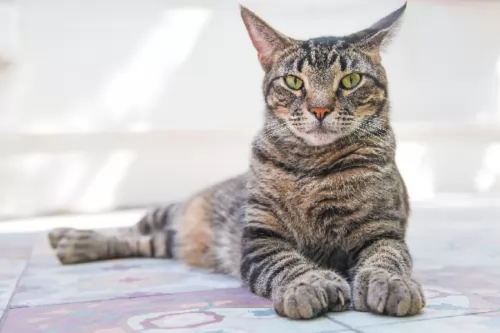 It is believed that this unusual cat came to the United States on ships – kept by sailors who thought of them as a good luck charm and to keep the mice population under control.
It is believed that this unusual cat came to the United States on ships – kept by sailors who thought of them as a good luck charm and to keep the mice population under control.
These unusual cats became popular in the 1800s as ship cats but the cats soon began to be seen in port cities on the Eastern coast of the United States as well as Canada, and their numbers began to increase.
It is also believed these interesting cats were brought specifically to the Boston area.
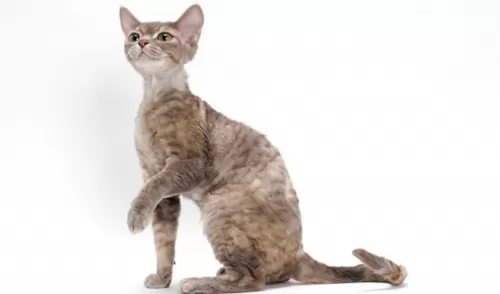 The Devon Rex is a cat known for its large ears and its curly, soft coat. It hails from England, emerging in the 1950s.
The Devon Rex is a cat known for its large ears and its curly, soft coat. It hails from England, emerging in the 1950s.
The cat is recognized by quite a few cat associations. The first of these cats was discovered by Beryl Cox in 1959 in Buckfastleigh, Devon. When the cat started appearing in cat shows in the UK, people starting becoming interested in owning these unusual cats.
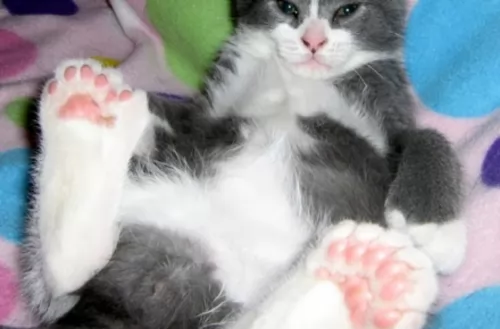 The Polydactyl cat is unusual in that the cat has been born with something odd about it. It has more than the regular number of toes on just one or more of its paws.
The Polydactyl cat is unusual in that the cat has been born with something odd about it. It has more than the regular number of toes on just one or more of its paws.
Normal cats have a sum of 18 toes, with 5 on the front and 4 on the back but with Polydactyl cats you may find as many as 9 digits on their front and back paws.
American Polydactyl cats are medium to large in size with strong, muscular bodies. The cat can weigh up to 6kg. The head is broad, the ears wide-set and pointed and the coat can be any color, pattern and length.
These cats are easy-going, relaxed, and social. They’re hardy too and they’re able to enjoy being outdoors and indoors.
They’re affectionate with their human family and are also playful and energetic. It is prepared to be friendly with dogs and children too, but it is also able to act independently and get on with things. The Polydactyl cat is distinctive but also a very popular cat breed.
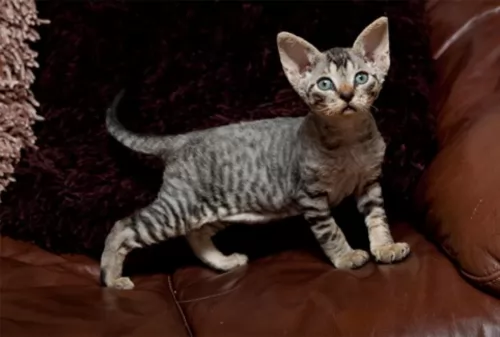 Known for its slender, light build, and weighing roughly between 2 and 4kg, the medium-sized Devon Rex has large, rounded ears. It is the large, rounded ears, set low on the sides of the broad head that make it slightly gremlin-like in appearance.
Known for its slender, light build, and weighing roughly between 2 and 4kg, the medium-sized Devon Rex has large, rounded ears. It is the large, rounded ears, set low on the sides of the broad head that make it slightly gremlin-like in appearance.
Their eyes are also large, and their noses are slightly upturned. It’s short, curly coat is another unusual feature and comes in many colors and patterns. The eyes can be blue, yellow, copper or he can be odd-eyed.
Your Devon Rex is quite a naughty cat, enjoying getting up to all kinds of mischief. Energetic, they love leaping up high onto perches so you’ll often find your Devon Rex in odd spots, more so if it's a spot in the sun as he loves warmth. It is why it is important to buy a cat tree for this cat.
It’s a loving, loyal cat and it will attach itself to one member of the family and then they are capable of pouring out the love and affection on this particular person. They’re also playful cats, as well as being intelligent.
He can learn a few tricks and can also be trained to walk on a leash. This is an active, energetic breed and will provide his human family with hours of amusing entertainment.
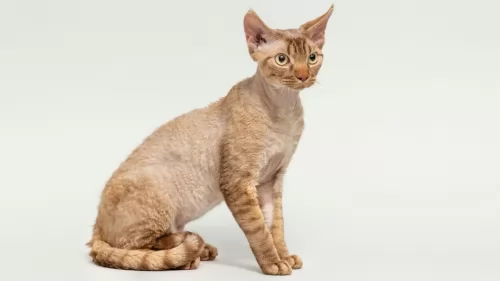 Your Devon Rex is a social cat and is happy to be found on your lap. He doesn’t take kindly to being left on his own though. He isn’t a suitable fit for someone who works all day.
Your Devon Rex is a social cat and is happy to be found on your lap. He doesn’t take kindly to being left on his own though. He isn’t a suitable fit for someone who works all day.
If you love animals, then maybe another companion animal would be a good idea as he is an amicable cat and gets on well with other animals.
When you spend time with your cat, make sure it is a special time, full of treats and stimulating play as he will learn to even fetch a small ball.
Just give him lots of attention and he’ll be your provider of companionship and entertainment.
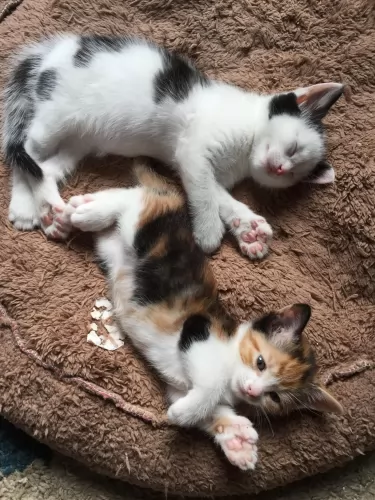 With good care, these cats can live to be between 14 and 16 years of age. You need to be diligent with keeping this cat’s nails trimmed because depending on the placement of the toes, the nails could become a nuisance, growing in the wrong direction and cutting into he cat’s flesh.
With good care, these cats can live to be between 14 and 16 years of age. You need to be diligent with keeping this cat’s nails trimmed because depending on the placement of the toes, the nails could become a nuisance, growing in the wrong direction and cutting into he cat’s flesh.
Keep the nails trimmed as necessary. To avoid possible injury to your pet, your veterinarian can safely trim your cat’s claws.
Always pay attention to your cat's behavior as well as taking note of your cat when you groom him as both are good ways to discover whether anything is amiss with your polydactyl cat.
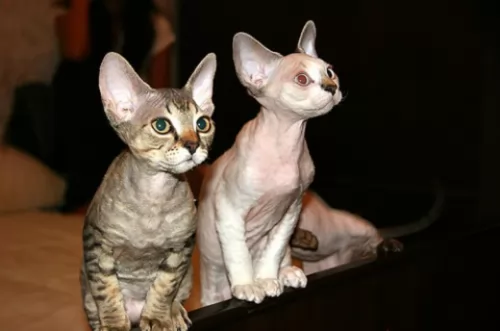 This particular cat isn’t known for any extreme health issues but even so, there are some health problems that are important to know about -
This particular cat isn’t known for any extreme health issues but even so, there are some health problems that are important to know about -
This is where the patella or knee cap moves out of its usual spot. It can occur because of a number of reasons such as an injury or congenital malformation. The vet will want x-rays because sometimes hip dysplasia is also present.
This is an inherited condition seen in both male and female cats and usually in young kittens. The cat has an odd gait with a head that bobs along as is tries to walk. The cat has tremors and also has difficulty with swallowing. With a visit to the vet and special care, your cat can do well.
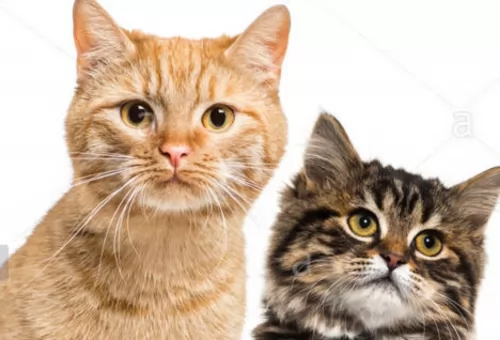 Keep an eye on your cat’s paws as their extra toes can make it that they are at a higher risk of hooking on a carpet or some other material, but this can be managed with regular nail trimming.
Keep an eye on your cat’s paws as their extra toes can make it that they are at a higher risk of hooking on a carpet or some other material, but this can be managed with regular nail trimming.
Provide your cat with all the things he needs to make his life pleasant while in your care. He’ll need feeding and drinking bowls, a nice warm, dry bed, a litter box, stimulating toys, and things such as a scratching post and cat climbing tree.
Cats are meat-eaters, and they need protein from meat for health. Some cooked chicken and beef can be a real treat for your pet. Grains and carbohydrates should only play a very small role in your pet’s diet. Too many grains can lead to malnutrition and obesity as well as problems with your cat's organs.
Always take into account your cat’s age because different life stages mean different energy levels and therefore different nutritional needs.
Take your sick cat to the vet when you see he is not his usual self. Make sure you keep up to date with all his vaccines and anti-parasite treatments.
One of the most important health decisions you’ll make for your Polydactyl cat is to have your pet spayed or neutered. The procedure is common and performed in your vet’s office every day.
It offers lifelong health benefits. It improves your pet’s behavior and keeps them close to home too. Spaying a female cat will prevent uterine infections and breast cancer, and for males, it can prevent testicular cancer.
Best of all, it helps to prevent yet more kittens into a world overrun with stray cats and rescue centers jam-packed with unwanted kittens and cats.
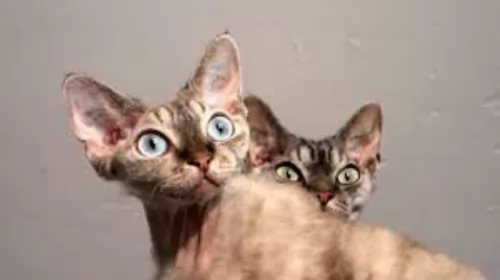 The Devon rex cat breed is known for its unusual looks with its wavy fur, large ears and large eyes. It is considered a rare breed and you want to make sure that you take proper care of him.
The Devon rex cat breed is known for its unusual looks with its wavy fur, large ears and large eyes. It is considered a rare breed and you want to make sure that you take proper care of him.
Owners of the Devon Rex know that these cats love their food and it has to be top quality food to enhance good feline health.
Cats are carnivores, ad this actually means that they should stick to a meat diet. Any food you buy your cat should be mainly meat. Look at the packaging of the commercially manufactured cat foods you want to buy, and make sure that the first few ingredients are some sort of meat.
Remember that any uncertainty with feeding your cat, you can chat with your vet.
Keep the inside of your cat’s ear free of an accumulation of wax and dirt as well as infection. If you don’t like the idea of probing in your cat’s ears, be in contact with your vet or a reputable, professional cat groomer.
Trim the cat’s nails.
Check inside his mouth for bad teeth as this could be causing him pain.
Clean your cat’s litter box every single day and also replace the grit regularly.
Get your cat veterinary care as soon as he shows signs of illness. Certainly, make sure all his vaccines and deworming are up to date.